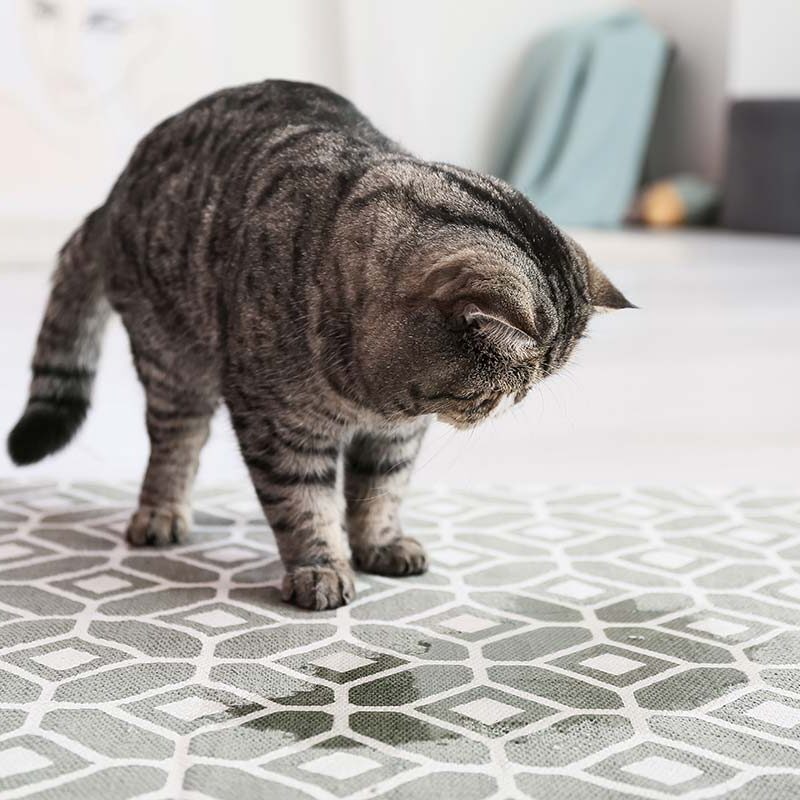
Feline lower urinary tract disease (FLUTD) is a general term encompassing various conditions affecting a cat’s bladder or urethra. FLUTD can cause discomfort and pain, and if left untreated, it could lead to serious health issues.
What causes FLUTD?
Several factors can contribute to FLUTD, and it’s often a multifactorial disease. Possible causes include:
- Feline idiopathic cystitis (FIC): This is the most common diagnosis in cats with FLUTD. FIC essentially means that there is bladder inflammation of an unknown cause, though it is well speculated that stress is a significant factor in FIC development.
- Urolithiasis (bladder or urethral stones): These are solid mineral formations that can irritate or block the urinary tract.
- Urethral obstruction: A blockage in the urethra, which can be caused by stones, mucus plugs, or inflammation. This is a life-threatening emergency and requires immediate veterinary attention.
- Urinary tract infection (UTI): Bacterial infections, although less common in younger cats, can also cause FLUTD.
- Other potential factors: Diet, urine pH, obesity, low water consumption, prolonged urine retention, anatomical defects, tumors, and even behavioral disorders can play a role.
Recognizing FLUTD Symptoms
Watch out for these common signs that may indicate your cat is experiencing FLUTD:
- Straining to urinate: Repeatedly visiting the litter box but producing little to no urine.
- Frequent urination: Urinating small amounts more often than usual.
- Painful urination: Crying out or vocalizing during urination attempts.
- Blood in the urine (hematuria): The urine may appear pink or red.
- Urinating outside the litter box (inappropriate urination): This can be a sign of discomfort or a change in litter box preferences.
- Excessive licking of the genital area: Attempting to address pain or irritation.
- Behavioral changes: Increased aggression, hiding, or lethargy.
Treatment for FLUTD
Treatment for FLUTD will depend on the underlying cause:
- Antibiotics: If a bacterial infection is identified through urinalysis and culture.
- Dietary changes:
- Wet food: Recommended for many cats to increase water intake and dilute urine to maintain urinary health.
- Prescription diets: Specific diets can help dissolve certain stones or prevent stone formation by adjusting urine pH and mineral content.
- Pain management: Medications like anti-inflammatories, nerve pain medications, or other more potent options may be prescribed to alleviate discomfort.
- Managing stress (for FIC):
- Environmental enrichment: Provide your cat with stimulating toys, scratching posts, and climbing opportunities to reduce boredom and stress.
- Consistent schedule: Maintain a regular feeding, play, and interaction schedule.
- Litter box management: Offer multiple litter boxes (one more than the number of cats in the household), keep them clean, and choose a litter type and box style your cat prefers.
- Reduce inter-cat conflict: Ensure adequate resources and separate spaces for multi-cat households.
- Reduce stressors: Any stimuli that are known to be stressful should be removed, if possible, or reduced at the minimum.
- Anti-anxiety medications or supplements: Your veterinarian may recommend medications or supplements to reduce anxiety and stress.
- Catheterization (for urethral obstruction): When an obstruction occurs, a urinary catheter is typically used to remove the blockage, often under sedation or general anesthesia, and may require hospitalization and intravenous fluids.
- Surgery:
- Stone Removal: Certain stones usually require surgical removal.
- Perineal Urethrostomy: In cases of recurrent urethral obstruction in male cats, a surgical procedure to widen the urethra may be necessary.
How to Prevent FLUTD
As mentioned above, a combination of factors is key to preventing FLUTD:
- Increase water intake:
- Feed a moisture-rich diet, such as canned food, instead of, or in addition to, kibble.
- Provide multiple water bowls in different locations around the house.
- Consider using a cat water fountain to encourage drinking.
- Ensure bowls are kept clean and filled with fresh water daily.
- Feed a proper diet: Choose a balanced diet appropriate for your cat’s age and health status. Prescription diets can be beneficial for preventing stone recurrence.
- Reduce stress: Address potential stressors in your cat’s environment by providing a stable and comfortable living space.
- Monitor urinary habits: Keep an eye on your cat’s litter box habits and urination frequency. Early detection can make a significant difference in treatment outcomes.
Important Note: A urethral blockage is a serious medical emergency and requires immediate veterinary attention. If you suspect your cat is having trouble urinating, especially if they are straining or producing little to no urine, contact your veterinarian immediately or take them to an emergency veterinary clinic.
Recent Posts
About Us
Knox Veterinary Surgery provides advanced orthopedic, soft tissue, and exotic pet surgeries right in your practice, making care easier for you and your clients. Serving Tennessee and surrounding states, we deliver skilled, compassionate care in a familiar setting.
